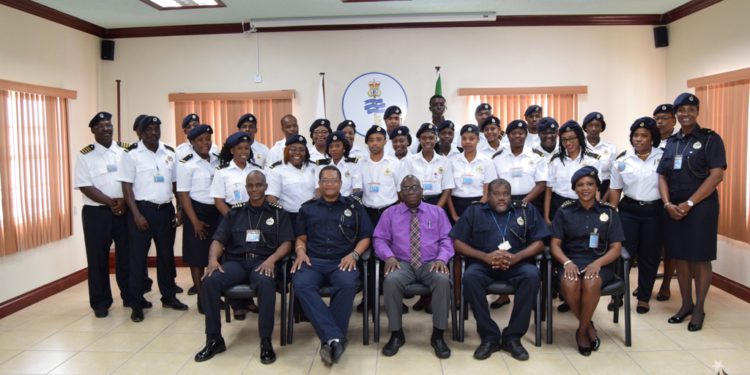Basseterre, St. Kitts, January 29, 2018 (SKNIS): Twenty-eight Junior Officers – 26 from the St. Kitts and Nevis Customs and Excise Department and two (2) from Her Majesty’s Customs and Excise Department of Montserrat are presently undergoing eight weeks of training in the 12thAnnual Caribbean Customs Law Enforcement Council’s (CCLEC) Junior Officers Basic Training Course.
The course , which runs from January 29 to March 02, will cover a number of topics including but not limited to Trade Facilitation and the Role of Customs; Diplomatic and Consular Rights and Privileges; Arrest Detention and Seizures; Criminal Investigation Awareness; Plant Quarantine and Toxic Chemicals; Ozone Depleting Substances – Montreal Protocol; Communication; Integrity; Risk Assessment; and Passenger and Baggage Search
Sessions will be conducted by the Department of Agriculture, Ministry of Trade, Foreign Affairs, as well as by Joseph Richardson, Retired Assistant Commissioner of Police.
“Customs Department has always embraced the need for partnership and collaboration and has relied on the technical assistance of a number of agencies in the past,” said Dianne Henderson Phipps, Senior Customs Officer Grade IV, adding that this year’s training will be no different.
Calvin Edwards, Deputy Financial Secretary, said that the course, which is “aimed at building the capacity of Junior Customs Officers”, as well as the topics to be delivered, are timely and relevant.
“The delivery of this training course is unique in that the facilitators are largely from the Customs Department in partnership with other government agencies… in other words it is home grown,” said the deputy financial secretary. “It is important that we put this training course in context by recalling the important role that Customs plays in our countries. This would give us a better appreciation of the importance of this training,” he added.
The deputy financial secretary used the occasion to welcome the 28 participants, particularly those from Montserrat. He noted that “it is always a pleasure to have you as participants” in the course and wished them success.
The Caribbean Customs Law Enforcement Council was established as an informal association of Customs administrations within the Caribbean region during the early 1970’s. To date, CCLEC has 39 members that span the Caribbean region and has extended its reach to Latin America, North America and Europe.
Its principal objectives in its early years were to exchange information on smuggling and help the smaller regional administrations adjust to the new threat of organized drug trafficking throughout the region. Later on in the 1990’s, the training sub-group for CCLEC recognized the need for a formalized training programme for Junior Customs Officers in the Caribbean.









